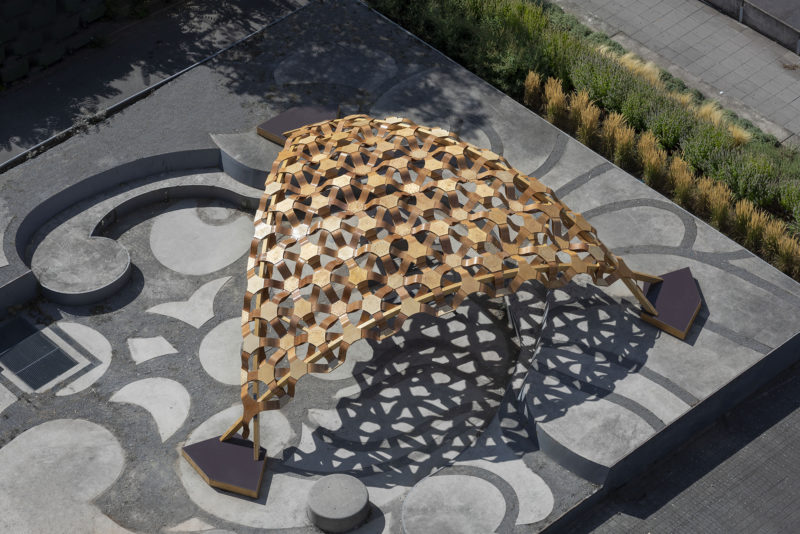On the 15thof August 2018, the official opening took place of the first experimental pavilion, realized by the department of Biobased Materials and Material Cycles in Architecture (BioMat), located at the Institute of Building Structures and Structural Design (ITKE) in the Faculty of Architecture and Urban Planning, University of Stuttgart.
The BioMat Research Pavilion 2017/18 covered an area of about 55m2 and an internal volume of approximately 130m3 with a span of 9.5m and a height of 3,6m. It is located at the University of Stuttgart’s Campus in Stuttgart’s city centre, Keplerstrasse 11, formed of a double-curved, and parametrically designed segmented shell of light, single-curved wood and biocomposite elements, which are supported by three curved crossed wooden beams.
BioMat department focuses on a mission of examining different sustainability aspects in architecture. This built 1:1 mock-up is the result of 10 months of intensive work, following many years of work in the field of applications of bio-based materials and diverse approaches towards future-oriented sustainable architecture.
In the course of research work prior to the construction of the pavilion, biocomposite plates were developed. The core of the plate was a flexible board made from natural fibres. The CNC cut fibreboard cores were later laminated from both sides with pre-cut 3D veneer sheets, allowing double-curvature. The processes of lamination and forming took place by means of a closed mould-pressing process with the assistance of a vacuum press bag.
Lamination did not only change the nature of the flexible core board into a 3D stiff bent element, but also allowed to create a biocomposite sandwich panel with adjustable mechanical properties allowing the originally available elasic material to be stiffened and applied as a structural component.
The holistic geometry of the shell resembles a 3D fabric in which the curved elements are connected to common nodes in all directions in space. This enabled the expression of new aesthetic architectural features of the future that was allowed through the application of digital fabrication technologies and data-flow management.
The work was the direct result of cooperation between experienced architects, around 40 architecture students over two semesters, with support from the University of Stuttgart, the German Agency for Renewable Resources (FNR) under the Ministry of Food and Agriculture (BMEL), the Baden-Württemberg Stiftung Foundation as well as other industrial funding.
Team:
Supervisor: Jun.-Prof. Dr.-Ing.
Hanaa Dahy
Tutors: Michaela Mey, Piotr
Baszyński, Jan Petrš
Students SS18:
(Design Development, Fabrication & Assembly)
Daniel Bieberstein, Lena Bienert, Claudia Böning, Julia Boos,Jasmin Min Chu,
Yamac Ölcer, Silvia Richter Martínez, Reza Sadeghi, Timo Sippach, Lisa
Unterberger, Quim Vilafranca Molero, Francesca Weiß, Sihui Wu
Students WS17-18:
(Concept Development) Mariana Zollino – initial concept author of the assembly module.
Helena Bartl, Jake Benedikt, Wei Ju Chi, Arzum Coban, Jan Ingo Haller, Leroy Handojo, Juan Esteban Hernandez Cardona, Viktorya Ivanova, Julian Karl, Corinna Kernl, Laura Kiesewetter, Jasmin Min Chu, Quim Vilafranca Molero, Dominik Plag, Yamac Ölcer, Reza Sadeghi, Frederica Savioa, Timo Sippach, Allan Soares, Thomas Strasser, Schichao Wang, Hao Xu
Structural Analysis: Eindhoven University of Technology, Department of the Built Environment: Prof. Dr.-Ing. Patrick Teuffel, Prof. Arjan Habraken and M.Sc. Eng. Derk Bos
Consultants at the University of Stuttgart:
Institut für Konstruktion und Entwurf: Prof. Dr.-Ing. Ulrike Kuhlmann, Dipl.-Ing. Janusch Töpler
Institut für Ingenieurgeodäsie: Prof. Dr.-Ing. Volker Schwieger, Ing. Gabriel Kerekes
Technical support:
Andreas Kulla, Michael Preisack, Michael Schneider, Michaela Tondera
Students Scientific
Assistants:
Hasan Algan, Kristína Balušíková, Farnaz Fattahi, Masih Imani, Julian Karl,
Timo Sippach, Zerihun Waje
Special Thanks:
Florian Jonas, Nikolas Früh, Jian-Min Li, Felix Tineberg,Ibrahem Al-Salameh, Sofi Dawout, Hashim Nazari, Sofi Yousef, Laura Mesaric, Bich Nhu Ngo, Sebastian Guoth, Mobin Moussavi, Ahmad Razavi, Emi Shiraishi, Nima Zahiri, Eliza Biała, Xiaoyu Chen, Ruqing Zhong




One comment
Comments are closed.